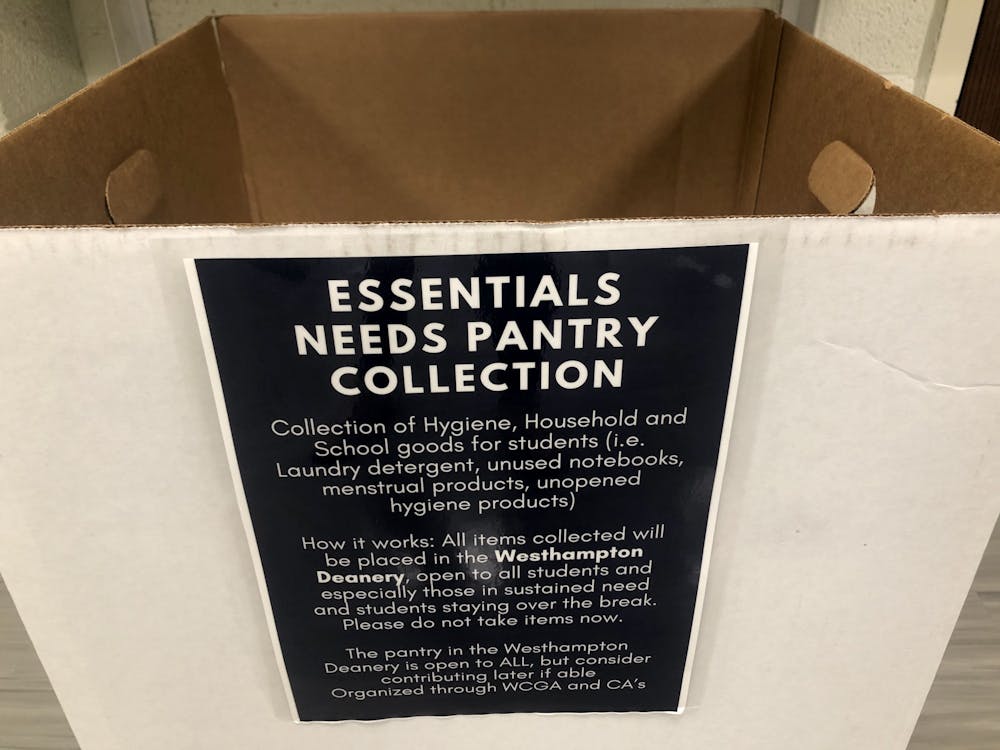Claire Tate, a Westhampton College Government Association senator, helped start an Essentials Needs Pantry this semester to provide University of Richmond students with material support and to mitigate waste on campus.
Tate and Kerry Fankhauser, associate dean of Westhampton College, came up with the idea after having a conversation about menstrual products.
Fankhauser said a parent of a UR student had called her during the summer of 2019 to donate a surplus of menstrual products. Last semester, Fankhauser informed Tate, a senior, of the donation because of Tate’s involvement with Planned Parenthood Generation Action, Fankhauser said.
Fankhauser said their conversation about the products had led to a recognition that other basic needs of students were not being met on campus.
“We started talking about other students that we know, not by name, but just other needs that we’ve heard of and things that we’ve heard from going to different things on campus,” Fankhauser said.
Creating a supply of basic-needs items for students would provide material support for those who need it but also the opportunity for all students to give back to their community, Fankhauser said.
“If [a product] is in great shape and someone else can benefit from it, why would you not pass that along?” she said. “I think that’s just part of being a responsible community member.”
Tate took the lead on turning the concerns brought up in the conversation into a tangible project, Fankhauser said.
Tate said she had proposed it as an initiative to WCGA as a whole during the middle of the fall semester. She said she had not needed to get approval to start it because she had used funding from the legislative affairs committee, which she is chair of, to finance the initiative.
The goal of the initiative is to collect donations from the student body in a way that’s anonymous and community-based, Tate said.
Tate gave examples of the products she is looking to collect through the initiative.
“It’s hygiene, household and unused school stuff,” Tate said. “So binders, notebooks, laundry detergent, soap that hasn’t been used, unused toothbrushes.”
Enjoy what you're reading?
Signup for our newsletter
Tate and the Cultural Advisers, students who live in residence halls to ensure safety and support for all students, distributed collection bins with signage to the laundry rooms of residence halls the first weekend of this semester, Tate said.
Head CA and junior Natalie Hawley said she had served as a connection between WCGA and the CAs. She had helped with the logistics of the initiative, such as informing residents, she said.
“Since we have that relationship element in the halls, it was our responsibility to get the word out,” Hawley said.
The main concerns Hawley and other CAs have with the Essentials Needs Pantry are stealing and vandalism, Hawley said.
“Obviously we haven’t seen yet, maybe it’s going to work very smoothly and nothing’s going to go wrong, but in case there are issues, I would love to work on finding more ways to make things just be safer,” Hawley said.
Tate said she did not know how effective the current method of collection would be because she had not yet begun gathering the donations from residence halls. She hopes it will be self-sustaining, Tate said.
Fankhauser said the self-sustainment of the initiative was her main concern.
“We never want to advertise something and then we’re relying on solely one way of something working and that falls through and we have no plan B,” she said. “Because then we’re letting down students and community members who were looking at this as a way of support.”
Considering sustainability at large, Tate said the initiative would help reduce campus-wide waste.
“It’s also to try to mitigate waste,” she said. “Like when people move out and they have stuff they’ve never opened or used, hopefully we’ll collect that, too.”
Lisa Miles, associate director of the Office of Common Ground, said she had attended a meeting with Tate in the fall to provide input on student needs.
“We do a lot of wonderful community service,” Miles said. “A lot of organizations, a lot of Greek life is doing wonderful philanthropy off-campus, but there are people within our community that can sometimes use our help.”
Miles said she thought it was important that the initiative was student-led and student-sustained.
“When students sort of take that initiative to say, ‘We can make this a little more equitable or a little bit easier for people to cope with,’ I think it says a lot to people to have it come from their peers,” she said.
Miles said financial aid programs, such as the Student Emergency Fund and Spiders Helping Spiders, had been helpful, but they had not accounted for all needs.
“We are a generous institution, and we meet 100% of demonstrated need,” Miles said. “And that’s always good, but individual circumstances are always going to vary. So I hope we just continue listening, and this relatively new policy that we have [the Essentials Needs Pantry], we’re willing to keep refining it and to keep listening to students who will tell us what really needs to be done.”
Tate said the designated location for the Essentials Needs Pantry would be in a chest on the first floor of the Westhampton Center to allow students 24/7 access.
Contact news writer Emma Davis at emma.davis@richmond.edu.
Support independent student media
You can make a tax-deductible donation by clicking the button below, which takes you to our secure PayPal account. The page is set up to receive contributions in whatever amount you designate. We look forward to using the money we raise to further our mission of providing honest and accurate information to students, faculty, staff, alumni and others in the general public.
Donate Now



